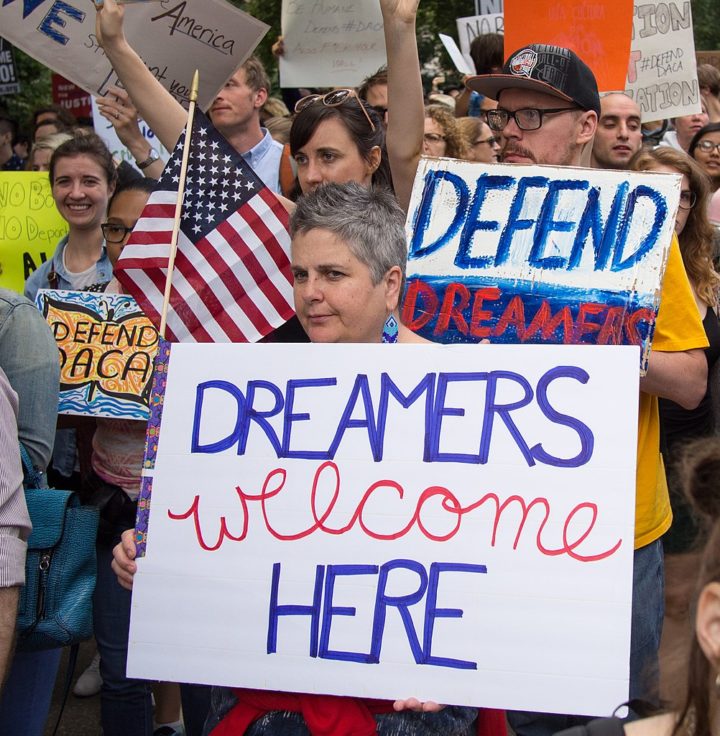By Jhon Sánchez
I cried when I heard the news that the Supreme Court had knocked down Trump’s intentions to rescind DACA (Deferred Action for Childhood Arrivals). DACA prevents deportation and grants work permits to those children who arrive in the United States and remain in the country during adulthood under specific educational requirements.
Writing for the majority, Chief Justice Robert’s holds that Trump Administration didn’t properly follow the procedure to rescind the benefits granted during President Obama. The Supreme Court states that Trump’s decision was arbitrary because it didn’t take into consideration the trust that people put on the law. DACA beneficiaries indeed bought houses, established businesses, enrolled in schools, and get married. CJ Roberts writes, “The consequences of the rescission, respondents emphasize, would “radiate outward” to DACA recipients’ families, including their 200,000 U. S.-citizen children, to the schools where DACA recipients study and teach, and to the employers who have invested time and money in training them.” According to the plaintiffs, if DACA would have been rescinded, employers would need to spend 6.3 billion dollars in retraining new workers, for example.
Even though we have reasons to celebrate, we need to see the other side of the coin. First, the Supreme Court didn’t recognize that Trump’s actions and statements were racially motivated and disproportionally affected Hispanics. For the court, it didn’t matter that Trump accused Mexicans of being rapists, but they are 78% of the DACA recipients. Justice Sonia Sotomayor was the only dissenting opinion on the point. For her, there was animosity against the Hispanic community, and the court should have prevented the administration from rescinding DACA based on the Equal Protection Clause of the Constitution.
Second, this is a decision based on procedural grounds, so Trump still can rescind it, and he wants to. Trump tweeted “The Supreme Court asked us to resubmit on DACA, nothing was lost or won. They ‘punted,’ much like in a football game (where hopefully they would stand for our great American Flag). We will be submitting enhanced papers shortly.”
Third, the Supreme Court’s decision means that the DACA is valid as Obama left it alive in 2012. But this doesn’t mean that Trump would not try to restrict its implementation. According to Nermeen Arastu, a clinical immigration professor at CUNY Law, the administration may grant renewals. Still, it would offer resistance to grant new DACA applications. She says that at the moment, different organizations are going to submit test cases, but these may be subject to litigation.
So far, our Dreamers, as we called DACA recipients, can work, go to school, get driving licenses, and practice license professions. We need to take into consideration that this is a non-permanent benefit that doesn’t lead to the path of citizenship. Dreamers need to plan their lives around the possibility of rescission, so they need to consider establishing their own businesses instead of working for a company, for example.
The Dreamers and we, their supporters, need to organize around concrete issues. Here there are some:
- Support the American Dream and Promise Act of 2019 that now is the Senate and would make DACA permanent.
- Support State laws that grant licenses for occupations to applicants regardless of their immigration status. California already has a law in that regard. In New York, it’s still the case by case basis, and for example, Cesar Vargas was the first undocumented person license to practice law in the State.
- Support campaigns to grant driver licenses in different States.
- Support a general immigration reform.
Finally, it’s important to remember that Dreamers need to work for comprehensive immigration reform. This is because they come from families with mixed statuses where parents or siblings may be undocumented. They also need to campaign around labor protections to be effectively applied to documented and undocumented people as well. They need to be part of BLM movement because Latinx, as people of color, are also victims of police violence and constitute 19 percent of the incarcerated population in the United States.
We hope that Trump won’t be reelected, and DACA would be permanent. But for now, Dreamers can breathe.










